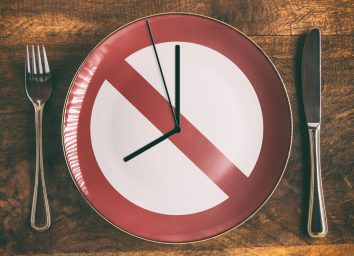Should You Combine the Keto Diet and Intermittent Fasting for Better Weight Loss Results?

Two of the biggest weight-loss trends these days are the keto diet and intermittent fasting (also known as IF), and according to experts, they might be even more effective when combined.
What is the keto diet?
The keto, or ketogenic diet, is a dietary protocol that has long been used to treat epilepsy, but it can also be profoundly helpful for weight loss. Keto involves drastically changing the intake proportions of the three basic macros in one’s diet to:
- 75% daily calories should come from fat
- 20% daily calories should come from protein
- 5% daily calories should come from carbohydrates
By upping the intake of fat in one’s diet to such an extent, the body is forced into ketosis: Because it does not have enough glucose to use it as its main energy source, the body will break fat down into ketones and burn those instead. In essence, explains Christine Hronec, the founder of Gauge Girl Training, on a ketogenic diet, “the body is fueled by fat.” And not just dietary fat. When paired with a caloric deficit, the body will tap into stored fat as a fuel source, supporting a reduction in body fat as well.
What is intermittent fasting?
Intermittent fasting (IF), meanwhile, as its name suggests, is a practice of regularly abstaining from food. While there are different forms of intermittent fasting, such as alternate day fasting, which calls for severe food restriction every other day, or the 5:2 protocol, involving five days of normal eating and two days of severe restricting per week, the most common, most popular, and most studied form of IF is 16/8. The 16/8 protocol calls for a 16-hour daily fast, most of which takes place at night. Someone doing a 16/8 fast will restrict all eating to a daily eight-hour window—for example, from noon to 8 p.m.—and consume no food in the remaining 16 hours of the day.
Intermittent fasting naturally contributes to weight loss, first and foremost simply by reducing the number of hours during which one can eat, therefore reducing the number of calories one can feasibly consume in a day. For Brian St. Pierre, director of performance nutrition at Precision Nutrition, this is “the main reason IF works. It reduces the amount of time available for eating, which makes it harder to eat more than you need, as you have less time to get those calories in,” he says. “It’s not physiological magic.”
For Hronec, prolonged fasting can actually help with feelings of deprivation. “It’s easier for most people to fast during the morning before they start eating,” she says. “By extending the feeding window into the early evening, it naturally suits most people’s cravings for greater volumes of food later in the day. This experience tends to keep people satisfied and feeling like they are not in a caloric deficit.”
But intermittent fasting has other benefits for weight loss, too. The practice has been shown to reduce inflammation and improve blood glucose control, both of which can help with weight loss. According to Dr. Will Cole, leading functional medicine expert and author of The Inflammation Spectrum and Ketotarian, inflammation may contribute to fat-storing hormone imbalances like leptin resistance or insulin resistance. “Reducing inflammation helps to improve weight loss, boost brain health, restore energy, and so much more,” he says.
What are the benefits of combining keto and IF?
Combining keto and IF has become a popular protocol with a one-two punch that experts say can be exceedingly helpful. “It is a powerful combination,” says Lori Shemek, PhD, CNC, bestselling author of How to Fight FATflammation!. This is true for a number of reasons, first and foremost of which is that fasting is one of the natural ways the body enters into ketosis on its own. “When your blood sugar is elevated, the pancreas releases insulin to lower your blood sugar and to shuttle the glucose into the cells,” explains Hronec. “By allowing your body more time to be in the fasted state, even when calories are equal, you will have a longer residence time to burn fat, as the pancreas can release glucagon for a longer duration, resulting in higher fat loss.”
In other words, IF can actually help boost the benefits of the keto diet. And the opposite is true, too: A keto diet can also make fasting even easier, according to Cole. “The more fat-adapted you are,” he explains, “the easier fasting can be.” Pairing the two makes a lot of sense: not just for weight loss, but also to increase the other health benefits of both protocols.
Is intermittent fasting keto ever a bad idea?
While experts note that for healthy people, combining keto and IF may be helpful, there are a few caveats. “There is less research on fasting in women,” explains St. Pierre. “And what research there is suggests that the results are more mixed in women.” This is due in large part to women’s key hormonal systems, which, he notes, are more sensitive to carb and calorie restriction. “Many women (though not all) find excessive fasting leads to more problems than benefits,” he says. “Women tend to be more sensitive than men to intermittent fasting due to the fact that they have more of the protein kisspeptin,” agrees Cole. “This fact can cause their hormones to be thrown off and subsequently mess up their cycle. While more research needs to be done surrounding this, in general, fasting can still be a great option for women if done properly.”
According to both Hronec and Shemek, women should begin with a 12/12 intermittent fasting schedule and gradually work their way up. “We naturally achieve ketosis while we sleep, assuming we do not get up to eat when we should be sleeping—which means we will have 8 hours of fasting under our belt. We just need a few more,” says Shemek. “Once you have 12 hours of fasting dialed in, you can then move on to 13, 14, or ideally 16 hours.”
And Hronec notes that, especially for women, “the 16/8 doesn’t need to be carried out daily for results. Doing it as few as three to four times a week can yield great results in women,” she says.
How do you manage hunger when you’re doing intermittent fasting keto?
Another issue of combining intermittent fasting and keto that could affect men as much as it does women is that of becoming overly hungry while fasting and overcompensating when breaking the fast. To manage hunger, experts suggest focusing on hydration. “When I do intermittent fasting, I allow coffee, water, tea, and sparkling water during the fasting window,” says Hronec. “Worst case scenario, if one finds herself unable to wait to eat, the fasting window can always be modified. For instance, if you were supposed to eat at noon, but ate at 11 a.m. instead, just stop eating at 7 p.m. that night instead of 8 p.m.”
Our experts also highlight the importance of the quality of the food one does eat once the fast is broken. Cole recommends choosing plant-based sources of healthy fats like avocado, nuts, and seeds, as well as wild-caught fish and low-carb veggies like Brussels sprouts and asparagus. “I can’t stress enough the importance of focusing on healthy fats and clean protein,” says Cole. “Since fat keeps you feeling fuller for longer, it satiates you enough to help curb cravings, so you won’t want to automatically reach for carb-heavy junk like bread or chips.”
Bottom line: Should you combine keto and IF for weight loss?
Yes, but make sure you evaluate your own eating behaviors before proceeding. Monica Auslander Moreno, MS, RD, LD/N, nutrition consultant for RSP Nutrition, cautions against integrating an IF routine if you are at risk of developing disordered eating behaviors. “People love structure and rule-based diets, and it doesn’t get more rigid than ‘no carbs and stop eating after 4 p.m.,’” she says. “But IF is not for women or men at risk of disordered eating, food obsession, or anxiety surrounding food as these conditions could be exacerbated by IF.”
She notes that mindful eating techniques are key to being successful with these diets. “The pairing of IF and keto can be a good idea if the individual is aware of the potential difficulties of following such a restrictive approach,” says St. Pierre. “Ultimately, to lose body fat, one needs to be in a caloric deficit. IF and keto are not required to make that happen. But they can be a viable approach for folks who like eating lots of fat-rich foods, are comfortable not eating carb-rich foods, and who can go longer stretches without eating and not compensate later with overconsumption.”








